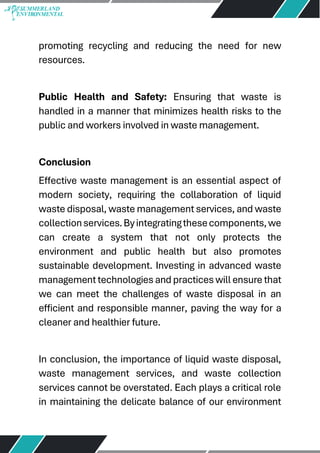What Does Reclaim Waste Mean?
What Does Reclaim Waste Mean?
Blog Article
The Best Guide To Reclaim Waste
Table of ContentsRumored Buzz on Reclaim WasteAn Unbiased View of Reclaim WasteNot known Factual Statements About Reclaim Waste Reclaim Waste for DummiesThe Facts About Reclaim Waste Revealed
Discover the kinds, incidents, and kinds of liquid waste. Residential sewer waste refers to the waste and products from a domestic septic storage tank. This kind of waste is created by human beings in residences, schools, and various other structures. This only includes septic containers that have a drainpipe area. The correct monitoring and disposal of residential sewage waste call for fluid waste to be transferred to a sewer treatment plant where the proper approaches and tools are related to purify and throw away waste.
Commercial waste usually includes potential risks, such as combustible products or a blend of fluid and solid waste products, and calls for an advanced and in-depth disposal process. The disposal of industrial waste generally involves the filtering of waste prior to transportation to ensure safe and proper disposal. Industrial waste is created from by-products and overflow of industrial procedures and manufacturing.
This sort of waste can not utilize the same sewage management transport or processes as septic or industrial liquids. The commercial waste monitoring process calls for the inspection and screening of liquid waste prior to it undertakes the disposal procedure (liquid waste disposal). Overflow waste is the fluid waste that comes from overflow and excess stormwater in very booming areas or cities
Overflow waste can cause contamination and flooding if not dealt with appropriately. Guaranteeing correct waste management can stop calamities and decrease ecological harm.
Rumored Buzz on Reclaim Waste
Call PROS Solutions today to learn more about our waste management and disposal services and the proper ways to care for the liquid waste you produce.
(https://www.huntingnet.com/forum/members/reclaimwaste1.html)This supposed 'wastewater' is not only an important source yet, after treatment, will be released to our land, waterways or the ocean. Made use of water from commodes, showers, bathrooms, kitchen sinks, washings and commercial processes is understood as wastewater.

water used to cool equipment or clean plant and tools). Stormwater, a form of wastewater, is runoff that flows from farming and urban locations such as roofing systems, parks, gardens, roads, courses and gutters right into stormwater drains pipes, after rainfall. Stormwater streams without treatment directly to neighborhood creeks or rivers, at some point reaching the sea.
What Does Reclaim Waste Do?
In Queensland, a lot of wastewater is dealt with at sewage therapy plants. Wastewater is transferred from residential or commercial websites through a system of drains and pump stations, known as sewerage reticulation, to a sewage therapy plant. Neighborhood governments develop, maintain and run most sewer therapy plants. Operators are licensed under the Environmental Management Act 1994 to discharge cured wastewater at additional resources an acceptable environmental criterion into rivers.
The Department of Natural Resources encourages regional federal governments about handling, operating and keeping sewerage systems and therapy plants. In unsewered areas, city governments may need householders to set up private or household sewage therapy systems to deal with domestic wastewater from commodes, kitchens, washrooms and washings. The Division of Natural Resources authorises using home systems when they are verified to be efficient.
The majority of stormwater obtains no therapy. In some brand-new neighborhoods, therapy of some stormwater to eliminate clutter, sand and gravel has started making use of gross contaminant traps. Wastewater therapy happens in four phases: Eliminates solid matter. Larger solids, such as plastics and other things incorrectly discharged to drains, are gotten rid of when wastewater is travelled through displays.
Wastewater then moves into huge storage tanks where solids settle and are gotten rid of as sludge. Oil and scum are skimmed from the surface. Utilizes tiny living microorganisms understands as micro-organisms to damage down and get rid of remaining liquified wastes and fine fragments. Micro-organisms and wastes are incorporated in the sludge. Gets rid of nitrogen and phosphorus nutrients that could create algal flowers in our rivers and intimidate aquatic life.
More About Reclaim Waste
Nutrient removal is not available at all sewer therapy plants since it requires costly specialist equipment. Clear liquid effluent generated after therapy may still consist of disease-causing micro-organisms - liquid waste disposal melbourne.

A lot of wastewater moves into the sewage system. Under the Act, local federal governments provide authorizations and licences for eco appropriate activities (Ages) involving wastewater releases that might have a neighborhood impact.
The Buzz on Reclaim Waste
Tracking gives valid info concerning water top quality and can confirm that licence problems are being met. The information obtained via tracking supplies the basis for making water high quality decisions.
Report this page